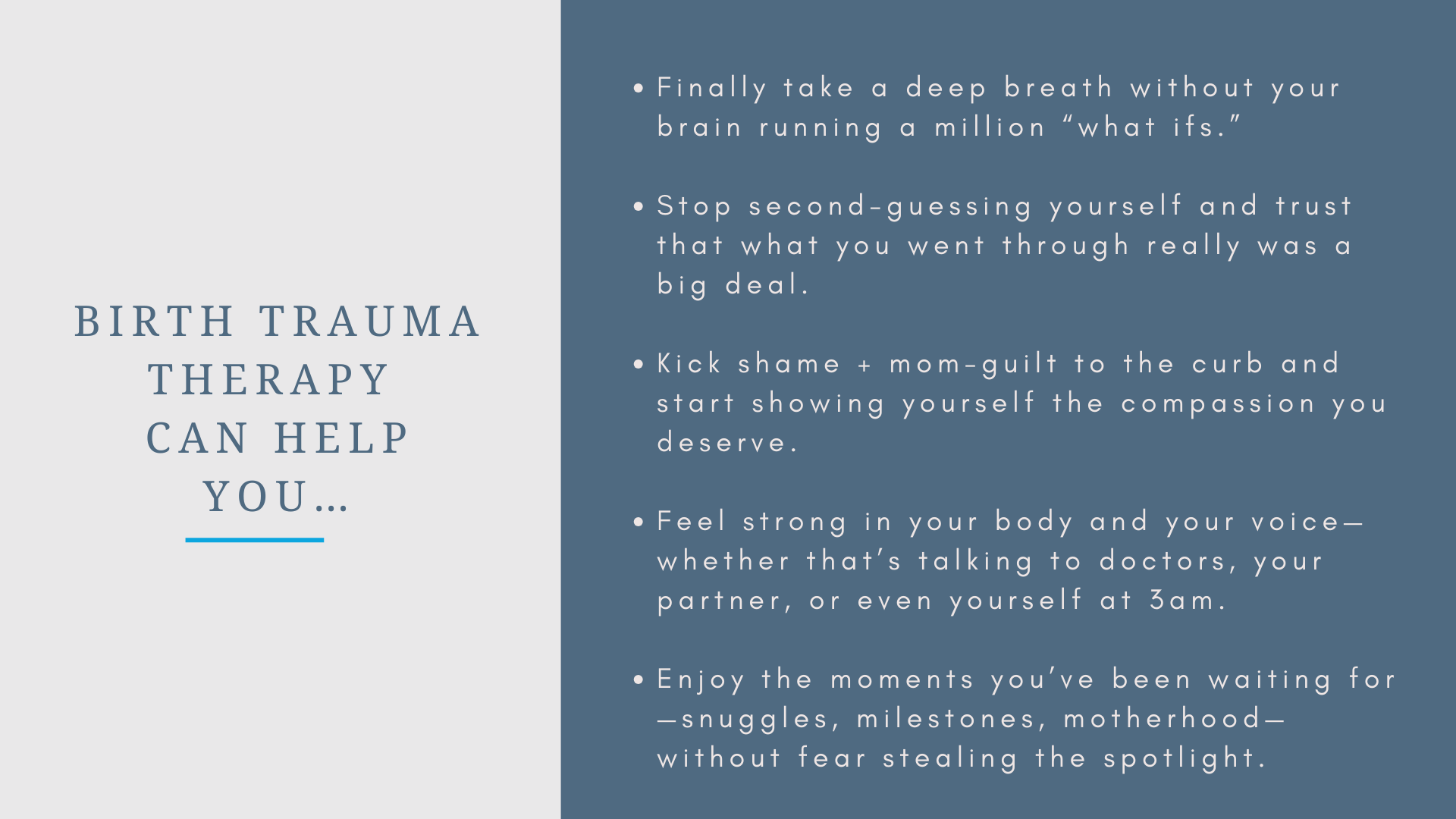
Birth Trauma Therapy in Columbus, OH and online across Ohio
Support for when birth was harder than expected.
A safe space for women in pregnancy, motherhood, and on their fertility journey to feel accepted, supported, and fulfilled.
You can’t stop thinking about your birth experience.
It just. keeps. replaying.
Out of nowhere, the memories crash in—sharp and sudden. Your chest tightens, your heart races, your breath disappears. You’re just trying to hold it together, but calm feels out of reach.
Maybe it happens in the car at a red light. Or while standing in the never-ending line at Target. One second you’re fine, the next you feel trapped, panicked, like I can’t do this anymore.
Maybe you’re constantly checking to see if your baby is breathing. Maybe you can’t shake the thought that something bad will happen to your partner. Or maybe you lie awake at night terrified about what would happen if you weren’t here to raise your child.
You don’t have to sugarcoat it. Your birth was traumatic
And trauma doesn’t always look one way.
For some moms, it was hours of labor followed by losing too much blood. For others, it was hearing the words “we need to use forceps” or “baby’s heart rate is dropping” while everything spun into chaos. Maybe your baby was whisked to the NICU before you even got to hold them. Maybe now you’re juggling specialists and appointments, all while grieving the birth (and future) you imagined.
And maybe, just maybe, you’re pregnant again—and the thought of going through it all over is terrifying.
Here’s what I need you to hear:
Trauma isn’t always the “big, obvious” stuff society names.
It can be subtle. It can be the loss of choice. The speed of medical decisions. Missing out on skin-to-skin. Not getting those first moments you’d pictured a thousand times.
Even if people tell you “it wasn’t that bad” or “at least you and baby are healthy,” your body remembers differently. And it’s okay if you’re still crying weeks later. If you’re angry. If you’re worried about bonding with your baby.
Because birth trauma isn’t “just a hard day.”
It’s joy being replaced with terror. It’s powerlessness where there should’ve been choice. And it sticks with you—shaping birthdays, future pregnancies, how you see your body, how you trust yourself, how you trust providers.
And then the world piles on with toxic positivity: “Be grateful. Stay positive. Move on.”
But let me tell you this, mama:
Your pain counts.
Your story matters.
And you don’t have to carry it alone.
I’m here to help
I’m a licensed trauma therapist—and a fellow mama who’s been through a traumatic birth myself. I know how heavy it can feel, and I want to help guide you through it.
Together, we’ll work to heal so you can feel at peace again. Not just coping or getting by, but actually feeling calmer, lighter, and more like yourself—even if motherhood has changed you.
Healing can mean less fear and anxiety, fewer spirals of overthinking, and letting go of the shame and self-blame that weigh you down. It’s no longer being triggered every time you see a hospital or have an appointment. It’s finding the words to make sense of your story, feeling validated instead of minimized, and feeling confident to set boundaries or advocate for yourself and your baby.
And when healing begins, it touches everything—your relationships, your parenting, your sense of self. You may feel more connected, more flexible, and more open to joy. You learn to trust your intuition again, use your voice, and give yourself the care you deserve. Healing doesn’t just ease the fear—it changes how you see yourself, your body, your relationships, and your future.
Choose your own timetable…
because healing doesn’t look the same for everyone.
Some moms want space to process slowly, week by week. Others want to dive in and get relief fast. That’s why I offer two ways to work together—so you can choose the kind of support that feels right for you.
Your Birth Story Doesn’t Get to Define The Future

Frequently Asked Questions about Birth Trauma Therapy
-
Birth trauma therapy is counseling that helps parents process and heal from a traumatic birth experience. It may involve symptoms of PTSD after childbirth, anxiety, depression, or difficulties bonding with your baby.
-
Signs you may benefit from birth trauma therapy include flashbacks, nightmares, feeling anxious or on edge, avoiding reminders of childbirth, or feeling detached from your baby. If your birth experience feels overwhelming or continues to impact daily life, counseling can help you heal.
-
Yes, postpartum PTSD is a real and recognized condition. Therapy for birth trauma can help reduce intrusive thoughts, hypervigilance, and emotional distress so you can feel safe and connected again
-
Postpartum depression often includes sadness, low energy, or hopelessness, while birth trauma therapy focuses on processing a specific traumatic experience during birth. Some parents experience both, and a trained therapist can address each with specialized care.
-
In therapy, you’ll have a safe space to share your birth story, process difficult emotions, and learn coping strategies. Some therapists also use evidence-based trauma treatments such as EMDR or somatic approaches to help you heal from childbirth trauma.
-
Healing is different for everyone. Some people find relief after just a few sessions, while others benefit from ongoing support. A therapist will work with you to create a plan tailored to your needs.
-
Yes. Healing from a traumatic birth can improve your ability to feel connected and present with your baby. Therapy can help you reduce anxiety and rebuild confidence in your parenting.



